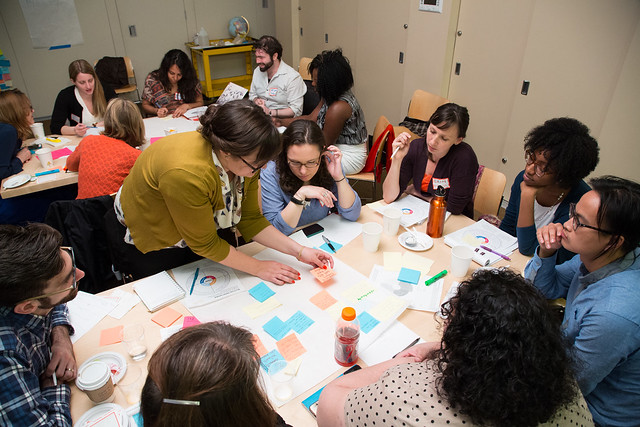In the last few months, and as plans for Mozilla Learning in 2016 continue to emerge, Hive Learning Network directors have been thinking about network design and relationships as key to how Hive participates and contributes to our vision of universal web literacy.
Hive is a core component of Mozilla Learning Networks, and is a dynamic model for developing relationships at the city level. Our audience is comprised of individuals, after-school organizations, museums, libraries, schools, civic technology, and cities eager to take creative risks to transform teaching and learning in a digital age. Hive creates a base of leaders to support the change we want to see, and help move more people from basic understanding of web literacy to full participatory know-how.
Hive is a relationship engine — an intentional, designed way to build connections that last. In our experience, there are five necessary conditions for cultivating successful relationships:
- Trust: Hive serves as a thought partner and known resource for digital literacies, so that members can bring challenges and opportunities forth
- Stickiness: Individuals and organizations demonstrate an active commitment to Hive through transitions (e.g., job changes) because they see value in participating
- Quality of connections: Access to wide-ranging and meaningful partnerships
- Replicable resources and practices: Techniques, programs, curricula, etc. have broad appeal and can be implemented by others
- Ongoing investment: Maintaining and soliciting new funders, institutions, and people
Hive is a convener, a facilitator, and a partner in building durable, purposeful connections toward achieving shared goals. Hive recognizes and benefits from the existing expertise that member bring into the network, and these relationships are instrumental and mutual. Individuals and organizations participate in a Hive ecosystem for various reasons, ranging from networking and professional development to access, expertise and funding.
The return on Hive relationships yield positive outcomes that transform systems. To facilitate this kind of return, you need time to learn with one another, the capacity to develop distributed leadership, and an engaged and active membership committed to changing systems and outcomes for youth.

Hive Chicago Buzz event, photo credit: Chicago Art Department
Relationships —-> full participation and leadership –> concrete outputs
Building from basic web literacy to full participation is accelerated and deepened by relationships. Jackie Moore is a member of Hive Chicago whose growth as an open web leader reflects the value of building universal web literacy within the context of long-term relationships. For several years she has been attending Hive Chicago monthly meet-ups to network, learn and share with other educators across the city. In 2014 she attended MozFest as an ambassador and advocate for Hive. She further developed her leadership within the network as an accountable member on the local Moonshot working group focused on transportation constraints for youth. Moonshots provide a focusing framework to collectively identif and .

Hive NYC Meet-Up
Hive relationships, projects and models fuel Mozilla’s web literacy efforts
Hive leverages trusted relationships and draws from tested projects and practices to feed the Mozilla Learning Network pipeline, have a larger impact on the city, and prepare more youth and educators to read/write/participate on the Web. Two concrete examples of Hive feeding Mozilla’s broader efforts are Maker Party — the annual campaign that evolved from the Hive Pop-Up event model — and the curricular modules for Mozilla Clubs, which were developed in collaboration with Hive members and organizations. Hive NYC‘s work with the New York City Department of Education’s Office of Post Secondary Readiness illustrates the amplifying effects that can result from a mutually beneficial relationship across networks.
Through a multi-year partnership with Hive NYC and the Digital Ready initiative, 30 local organizations have become ambassadors working with 15 public middle and high schools, reaching 1,500 students and bringing hands-on learning experiences with more intentional uses of the Web and technology. Hive facilitated these relationships as an intermediary to provide tested programs and practices to participating schools. In so doing, Hive NYC draws upon its unique relationships with educators and organizations, who apply their expertise and experience in Hive’s open-source learning labs to “teach it forward” with others.
These are just a few examples of how Hive serves as an engine for developing powerful relationships. With a shared vision for change and a focus on helping leaders achieve outcomes that matter, Hive cities continue to work towards our ultimate goal of universal web literacy.